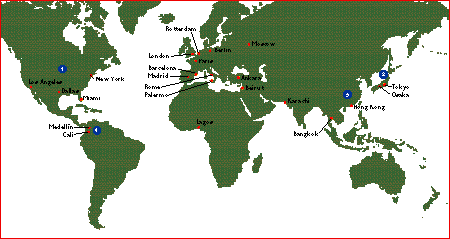
Were Hollywood to update its mafia geography, Al Capone’s Chicago would disappear from the map. According to organized crime experts, New York, Los Angeles, Dallas, and Miami would have the status of major capitals — not because of their local mobs, but rather as key entry points for drugs and cash in need of laundering, arriving from Latin America and Southeast Asia.
A baker’s dozen of other cities figure in the first rank, based on their importance to money-laundering and/or narcotics and arms trafficking: Karachi, Bangkok, Hong Kong, Osaka, and Tokyo in Asia; Beirut and Ankara in the eastern Mediterranean; Moscow and Palermo in Europe; Lagos in Africa; and the twin cocaine metropolises of Medellin and Cali in South America.
The Japanese Yakuza, despite operations in Hawaii and California, have for the most part clung to a local base of operations on the American model; Osaka and Tokyo’s places on the map are defined by the sheer affluence of the domestic economy and by the Yakuza’s outsized role in Japan’s mind-boggling real estate transactions. Its Little Caesar is the flamboyant Yoshinori Watanabe, who was inducted in 1989 as “kumicho” (boss of bosses), presiding over the 105 “oyabun” (bosses) of Japan’s 750 Yakuza gangs. With 22,000 “soldiers,” Watanabe’s outfit — the Yamaguchi-gumi — is easily the largest and most powerful.
But today’s main global counterparts to the old Purple Gang or Murder Inc. — along with the Sicilians and their new Russian partners — are the highly aggressive Chinese triads and the Colombians.
The triads, especially, have offshored with a vengeance in recent years, striking out from Bangkok and Hong Kong to establish themselves in Rotterdam and London, shoving aside European competitors for domination of the region’s heroin market. Their version of Capone is the Hong Kong-based To Luen-shun, emperor of the Sun Yee On triad and commander of a private army of more than 50,000 thugs. According to the Hong Kong Royal Police, the Sun Yee On controls a huge network of nightclubs, prostitution rings, counterfeiting presses, and drug processing facilities, and moves contraband of every conceivable variety through the People’s Republic of China.
The Colombian cartels, with offshore sites in Barcelona and Madrid, are no less expansionist: Cocaine use is the fastest-growing narcotics phenomenon in Europe, and crack — virtually unknown there five years ago — is now sold on the streets of Paris, Rome, and Berlin. The Colombians’ top man (for the moment) is the Cali cartel boss Gilberto Rodriguez Orejuela, nicknamed “the chess player,” who managed to outthink and outkill Medellin’s Pablo Escobar. He is personally said to earn $4 billion annually from cocaine, and has invested hundreds of millions in banks in Russia, Europe, and the United States.














